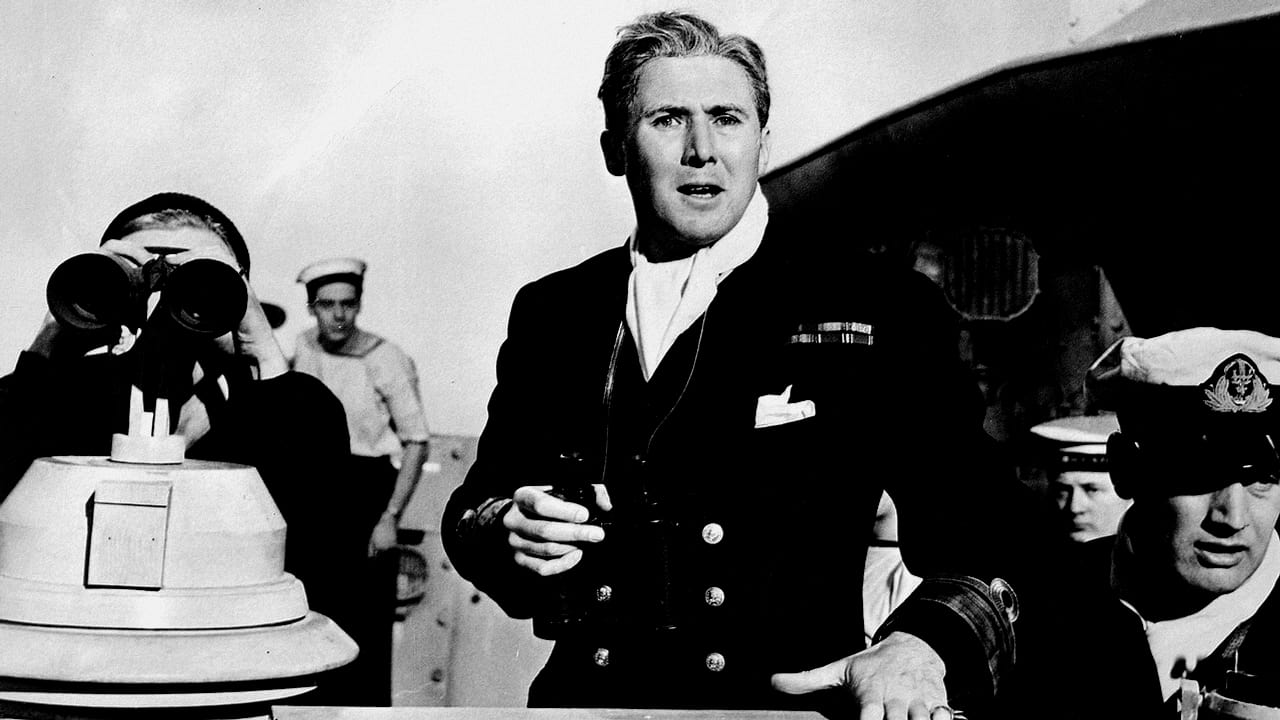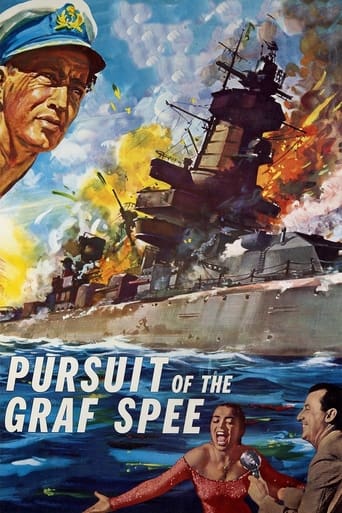



Not even bad in a good way
There are women in the film, but none has anything you could call a personality.
View MoreInstead, you get a movie that's enjoyable enough, but leaves you feeling like it could have been much, much more.
View MoreStrong acting helps the film overcome an uncertain premise and create characters that hold our attention absolutely.
View MoreCinematographically it is a poor, conventional film. Photography is at times excellent but that is not enough to overcome the defects of a mediocre script. The actors repeat their parts without much conviction (except Hawkins and Finch) and the Latin character of Christopher Lee (the future Dracula) deserves to be remembered in the history of cinema as one of the most exhilarating cartoons that have been seen in movies. For all the technical errors that the film contains and for the glamorous presentation of the cruelty of war, this work is disgusting. Not only is the view of war, the supposed chivalry of enemies, questionable, but also the lack of historical truth. The Graf Spee arrived at the coasts of Mar del Plata (south of the city of Buenos Aires) and there many sailors descended freely. This is top secret perhaps because of some unknown agreement between British, Argentines and Nazis. That is understandable in 1939, when the events occurred ... but not in 1956 when the film was made. In addition, to some extent, the no hidden admiration towards the Nazi chivalry shown in several scenes recalls Howard Hugues' "Hell's Angels" ... and Mr. Hugues had a great deal of sympathy for Nazi Germany. I do not know if it's a problem of inferiority complex on the part of Great Britain, but I remember that James Mason proudly incarnated Rommel in another film. It seems that not only several components of the British royal nobility admired the Nazis. In short: forgettable.
View MoreUpdated on 6/07/2018Just tried to watch this lousy film again and wished to upgrade the rating a little bit higher, but guess what, NO CAN DO! This is indeed one of the worst WWII films. The screenplay was so bad, the British naval force, three battle ships against one Nazi battleship No. 139, was a complete joke! The sea battle was so confusing, the salvos of the ship cannons were just messy, the British naval officers on the bridges of the the three ship all looked like amateurs, lots of small talks among them. Then the Nazi battleship escaped into Uruquay coastline, a neutral country during the WWII., the movie suddenly became a carnival before X'mas. Those sailors, officers and captains of the commercial ships sunk and captured by the Nazi ship all seemed to be on a cruise ship, they didn't look a bit worried about their fates. The Nazi German captain was a classic gentleman...Terrible script. This is perhaps one of the worst naval battle films or the champion worst British navy force against the Germany navy battle ship movie ever to show on the big screen.Lot of blah, blah and blah from each side, endless small talks among the Germans, the captives on the German ship, more bullshit-like small talks on the British vessels. Both of the German and British officers on their battle ships didn't look like they were in a cat-and-mouse war game, they all looked so relaxed like on vacation. Once the enemies were in sight, one of British battle ship captain was still in pajama, none of the officers and sailors looked like they were going to engage in a sea battle, nobody dressed for battle still wearing what they used to be.Every scene just looked so staged like a show that was so stupidly shot and directed following a stupid script with terrible dialog. I just couldn't believe those viewers who gave such a highly satisfying reviews of this lame and ridiculous film, and wondered if we were viewing the same movie.This is a movie that you and I should never so senselessly and unpredictably decided to watch. This movie would just make you feel how stupid you are like those who played roles in this movie. It only left a bad taste in your memory.
View MoreA largely historical accurate depiction of the events surrounding the first major naval battle of the Second World War, this is nevertheless a rather disappointing film. The script by Michael Powell and Emeric Pressburger is not up to the high standard that the set for themselves in the 1940s as it is quite badly structured. The last 45 minutes, which take place in Uruguay, are particularly dull. Very little of interest happens after the battle itself is fought. On the bright side, it is a beautiful looking and very well directed film which makes excellent use of real naval vessels rather than sets. Most notably, the HMNZS Achilles is used to represent itself, though by then it was the INS Delhi. It was decommissioned and promptly scrapped in 1978. The first half an hour is told from the German perspective aboard the Deutschland-class pocket battleship Admiral Graf Spee and it is most certainly the strongest part of the film. Had the rest of it been of the same high quality, I would have undoubtedly given it full marks. This was the Archers' most financially successful film but it's far from their best work, I'm afraid.The most interesting character is by far the Graf Spee's commanding officer Captain Hans Langsdorff, played in a brilliant performance by Peter Finch in what unfortunately amounted to little more than an extended cameo. After the first half an hour, he is barely seen until towards the end of the film, which is a serious mistake. It is a slightly bizarre decision on Powell and Pressburger's part after giving him so much prominence in the early part of the film. Langsdorff is a good, honourable and decent man who serves Germany loyally but he takes no pleasure in attacking British merchant navy ships. He develops a rapport with Captain Patrick Dove of MS Africa Shell, played very well by Bernard Lee, as he treats his prisoners with respect and humanity in accordance with international law. In a great scene, he has his men give them Christmas decorations to make their confinement more bearable, something which is nicely contrasted by the fact that he attacks another British ship moments later. Langsdorff does not hesitate to release the prisoners when the Graf Spee arrives in neutral Uruguay. At the end of the film, after he has scuttled his ship, Captain Dove tells him that he has earned the respect and admiration of everyone who has come into contact with him, including his enemies. This is one of the best scenes and there is a real sense that Langsdorff and Dove may have been friends if they were not fighting on opposite sides. At its best, their relationship was reminiscent of that of Clive Candy and Theo Kretschmar-Schuldorff in "The Life and Death of Colonel Blimp". The film ends before Langsdorff committed suicide on December 20, 1939, only one week after the titular battle.Speaking of the battle, what is depicted on screen is done so very effectively but I felt as if we were only getting half of the story. Never once do we see Langsdorff and his crew's perspective, only that of the crews of the Ajax, the Achilles and the Exeter and the prisoners aboard the Graf Spee. A major naval battle of this kind is almost like a chess match on a large scale and it is hard to become terribly involved in it if only one side's reactions are shown. This is especially disappointing since Langsdorff is clearly a brilliant strategist, as is his British counterpart Commodore Henry Harwood, so it would have been very interesting to see the perspective of the two opposing sides, as was often the case in later war films. Anthony Quayle is an excellent actor but he is more or less wasted in the role of Harwood, who only really comes into his own during the comparatively short battle sequence. He has far more screen time than Finch but far less interesting material. John Gregson is mostly a bore as Captain Frederick Bell but, in his film debut, Jack Gwillim is very good as Captain Edward Parry. It has a good supporting cast such as Christopher Lee, Roger Delgado, Michael Goodliffe, Ian Hunter, John Le Mesurier, Patrick Macnee, Nigel Stock and Anthony Newley but the script only provides Finch and Bernard Lee with a particular opportunity to stand out and neither of them were in it as much as I would have liked.Overall, this film has a great deal of unrealised potential. It could have made for an engrossing battle of wits between highly skilled opponents but, sadly, it was not to be.
View MoreIf you ever are suffering from insomnia just throw this in the DVD player. If you ever are suffering from insomnia just throw this in the DVD player. If you ever are suffering from insomnia just throw this in the DVD player. If you ever are suffering from insomnia just throw this in the DVD player. If you ever are suffering from insomnia just throw this in the DVD player. If you ever are suffering from insomnia just throw this in the DVD player. If you ever are suffering from insomnia just throw this in the DVD player. If you ever are suffering from insomnia just throw this in the DVD player. If you ever are suffering from insomnia just throw this in the DVD player. This review is as entertaining as the movie.
View More